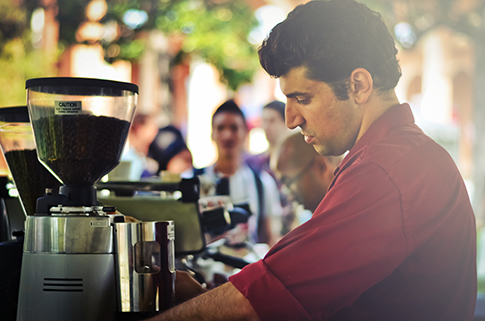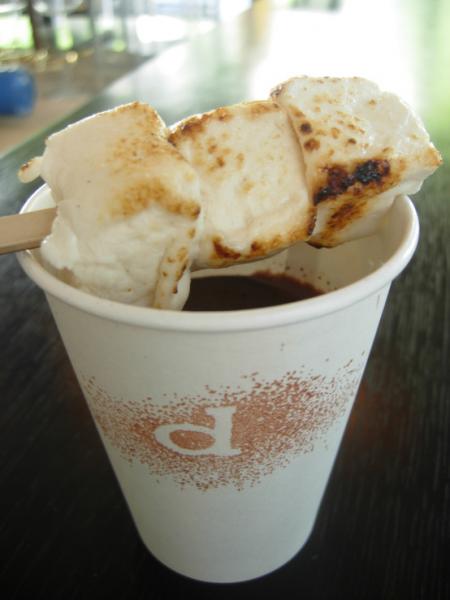Minimum Wage Plan Tastes Bitter To Café Demitasse

The corporate coffee company, with its universally recognized green mermaid logo, operates 21,000 stores in more than 65 countries – including the spot just a block from Demitasse in Downtown L.A.’s Little Tokyo.
As if it weren’t enough to compete with a Starbucks outpost serving three or four times more people than his own cafe, Roshan may soon confront a new challenge: Coping with a minimum wage hike that could compel him to pay six employees, about half his workforce, $13.25 an hour by 2017.
“It’s going to be scary, for sure,” he said.
Labor accounts for 20 percent of Roshan’s costs. His profit margin hovers at roughly 10 percent, sometimes slipping to the single-digits and never passing the low teens.
SEE ALSO: The Hidden Costs Of Raising The Wage
Roshan’s big issues with the raise? It’s not coupled with anything else to boost the economy. Rather than simply raising pay, Roshan thinks the city should cut red tape and fees so he can save money – and afford to pay better wages.
“The mayor’s angle is we want to reduce poverty, we want to make L.A. affordable,” Roshan said. “They can do things for free to really help encourage growth in Los Angeles.”
The city is not “business-friendly” by “any stretch of the imagination,” in Roshan’s perspective.
As a first-time business owner, he learned on the job to navigate the “hell” of city permitting, negotiate with contractors and plan the logistics of crafting and serving the perfect cup of joe.
And he paid the price: $14,000 on permits and fees just to open.
“I could tell you horror story after horror story about the bureaucrats, the inspectors,” Roshan said, recalling the several months he spent in preparation without earning a penny.
.jpg)
And he went on a personal campaign to attract customers. Known to friends as “Bobby,” he made a point of meeting the locals and planning community events like live jazz nights on the patio. Neighbors, initially skeptical that this exuberant first-timer could pull off a gourmet café in a former yogurt shop, became some of his most loyal customers.
Still, the café is fighting to stay in the black. Roshan declined to give his exact revenue, but said each location sees 200 to 300 transactions a day, with prices ranging from $3 to $6. The most popular item is a $4 latte, meaning daily sales could hover between roughly $800 to $1,200.
The second café turned a profit much rapidly than the first, since Roshan could put hard-earned lessons from Little Tokyo straight into practice.
“I was a lawyer before this, so I had no idea about running a coffee shop,” said Roshan, who graduated from USC’s law school in 2008.

Now he again may need to put un-tested theories into action to avoid financial ruin. The possible scenarios don’t look too bright.
Roshan could raise prices, but what if customers get scared off, and start buying less? Already, his prices are pretty high, up to $6, the maximum he thinks people will pay for gourmet brews. The “super rare, exotic” brew called “Geisha” wouldn’t sell at all.
He could shut doors earlier than the usual 10 p.m. close time, cutting back on operational and labor costs. But then he would lose sales from the after-work hours.
Relocating his Little Tokyo cafe to another city, like West Hollywood or Culver City, is another option, although those cities might follow L.A.’s lead and hike wages as well. Or perhaps he’ll keep it open, but scrap plans to open a third location in Venice, which is in L.A.
Already, he’s observed a “chilling effect” among café and restaurant owners hesitant to open in L.A. since they must plan ahead to sign a five or ten-year lease.
Then there’s a more drastic way to avoid losing money: “If we’re in the red, we’re going to have to shut down.”
Despite a boom of specialty roasters over the past few years, the city’s “Starbucks culture” persists since its cafes are ubiquitous and familiar.
Roshan hopes his fellow indie roasters will encourage people to keep drinking. Perhaps one day the city will one day become like Portland, which gives the impression of sustaining a specialty coffee shop on every corner. That city’s minimum wage is $9.10.
This story is part of a minimum wage series produced by USC Annenberg's M.S. students.
Contact Contributor Daina Beth Solomon here.



